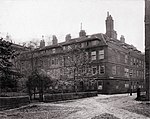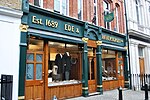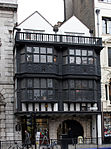Public Record Office
Archives in the City of LondonThe National Archives (United Kingdom)Use British English from February 2013

The Public Record Office (abbreviated as PRO, pronounced as three letters and referred to as the PRO), Chancery Lane in the City of London, was the guardian of the national archives of the United Kingdom from 1838 until 2003, when it was merged with the Historical Manuscripts Commission to form The National Archives, based in Kew. It was under the control of the Master of the Rolls, a senior judge. The Public Record Office still exists as a legal entity, as the enabling legislation has not been modified.
Excerpt from the Wikipedia article Public Record Office (License: CC BY-SA 3.0, Authors, Images).Public Record Office
Crane Court, City of London
Geographical coordinates (GPS) Address Website Nearby Places Show on map
Geographical coordinates (GPS)
| Latitude | Longitude |
|---|---|
| N 51.5153 ° | E -0.1106 ° |
Address
Maughan Library (King's College London)
Crane Court
EC4A 1BR City of London
England, United Kingdom
Open on Google Maps










